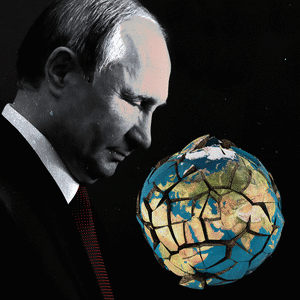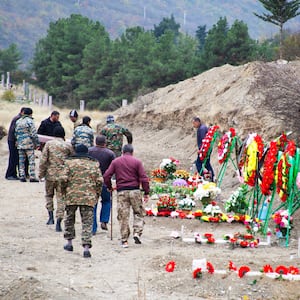LVIV, Ukraine—An awful screeching sound fills the air as fighter jets zip low and fast over the skies of Lviv Oblast, one of the few regions safe enough for the Ukrainian Air Force to fly uncontested as the battle for the sky rages across Ukraine. It is an ominous warning that fighting could be coming to a part of Ukraine that was previously untouched.
Bombs and rockets have been smashing indiscriminately into civilian and military targets throughout the country, as Vladimir Putin takes revenge on the nation he sees as insolent enough to defy him.
But when the daily air raid sirens ring out over the western city of Lviv, as rockets fly in from neighboring Belarus, no one pays it much attention. The bunkers are barely a few feet underground, a stark contrast to the 70-meter-deep monstrosities in Kyiv. “I reckon the entrance would just collapse under a bomb” one colleague remarked to me, “we would be safer in the middle of the road.”
ADVERTISEMENT
In the relative safety of Western Ukraine, the war feels far away and the scenes of carnage from Kharkiv and Kyiv so surreal that they could come from a film. “It still hasn’t sunk in with us here yet. The war is still far,” says Katya, a barista at a coffee shop in central Lviv. The residents are preparing for the upcoming battle—many civilian buildings are now sandbagged; Czech hedgehog anti-tank fortifications are laid all over the streets while checkpoints are being rapidly set up at all entrances to the city. The city has recently banned the sale of all booze, with authorities saying citizens need to keep their wits about them for the fight ahead.
In the film shown so far, Ukraine, the plucky underdog, has been a force to be reckoned with against the Vladimir Putin behemoth, bravely repelling Russian assaults on its major cities.

Members of the territorial defense battalion set up a machine gun and organize a military redoubt on February 25, 2022 in Kyiv, Ukraine.
Anastasia Vlasova/GettyThere is no shortage of heroism here. The ‘Ghost of Kyiv’ who allegedly shot down six Russian fighter jets on the first day, or the border guards of Snake Island who told a Russian warship “go fuck yourself!”, or the man who carried a mine out from under a bridge with a lit cigarette hanging from his mouth. Some of these stories have turned out to be dubious, or oversold, but they have had an extraordinary morale-boosting effect on the population. If the Ukrainian Ministry of Defense figures are to be believed, Russian forces have suffered tremendous casualties.
It is very difficult to independently confirm the figures, but U.S. officials have confirmed that the Russians have at least lost several thousand men. Locals certainly believe them.

A member of Ukrainian forces patrols the streets at Maidan square in Kyiv, on February 27, 2022.
ARIS MESSINIS/AFP via GettyRussian coordination and logistics have been a mess from start to finish. A 40-mile-long Russian armored convoy on its way to Kyiv has turned into a massive traffic jam, left stuck on a highway and burning through food and fuel. Ambitious airborne and amphibious landings, including on the Hostomel airport outside Kyiv, have been easily repelled by the Ukrainians.
Along with an unprecedented and united Western diplomatic response, all this has added up to an impression that the Ukrainians have, at least for now, an upper hand in the conflict, and that Putin is on his way out. But the dictator in the Kremlin is far from done with the brave Ukrainian people, and he is yet to unleash the most fearsome weapons in his arsenal.
Now that Russia’s efforts to deliver a quick knockout punch to the Ukrainian government has failed, military experts are concerned that his next steps could be far more brutal. Already, the Russian forces have started using much more indiscriminate tactics, including a rocket attack on an apartment block in Kharkiv that killed at least 18 people and injured dozens more this week. Then, a rocket attack on a TV tower in Kyiv killed five civilians, including a Ukrainian journalist.
“I’m afraid that there are very few examples in recent history—Baghdad in 2003 being one of them—where an invader has taken a major city by force against a determined defense without using heavy fires and doing extensive damage,” said Justin Bronk, the research fellow for air power and technology at the U.K.’s Royal United Services Institute. He told The Daily Beast that the Russians have not yet used the overwhelming superiority of their air force. In a report for RUSI, he wrote: “The fact that there have only been a few confirmed sightings of Russian fixed wing sorties over Ukraine should not obscure the fact that the VKS fixed wing fleets remain a potentially highly destructive force and one that could be unleashed… at short notice over the coming days.”
There have also been reports of the Russians moving thermobaric missile-launchers, which fire rocket explosives that set the air around them on fire. These weapons, considered illegal under the Geneva Conventions, are many times more powerful than traditional explosive weapons that have been seen in Ukraine so far. If they are used, it would suggest that the Kremlin is willing to raze the historic cities of Kharkiv and Kyiv to the ground and inflict extraordinary numbers of civilian casualties in the process.
Michael Kofman, an expert on the Russian military, wrote on Twitter that “The initial Russian operation was based on terrible assumptions about Ukraine’s willingness and ability to fight, and an unworkable concept of operations. Moscow badly miscalculated… use of fires has been limited compared to how the Russian military typically operates. Sadly, I think this will change.”
One nation that is well aware of the dangers of false optimism in the early days of a war is Armenia. At the beginning of their war with Azerbaijan over the Armenian-populated territory of Nagorno-Karabakh in late 2020, there was a huge swell of patriotism and a belief that because of their superior motivation, they would ultimately triumph. They ended up losing badly and ceding large amounts of territory they controlled to the Turkish-backed Azeri forces. They now look very cynically on the way the situation in Ukraine has been portrayed.
“I see many parallels between what happened in Armenia and what is happening in Ukraine,” said Ani Meljumyan, the Armenia correspondent for Euronet.
Armenians also were fighting for an ancestral homeland in what they called Artsakh, against a ruthless enemy with higher numbers and better technology. Like Ukrainians, they believed until the end in their inevitable victory.
“The words in Zelensky’s speeches, the way he dresses and talks, are identical to Pashinyan,” she told The Daily Beast, referring to Armenia’s populist president, who led the country during the Karabakh war. She said that Armenian authorities had frequently presented false optimism to the people, while secretly knowing that the war was going very badly.

Ukraine President Volodymyr Zelensky called on the West on March 3, 2022, to increase military aid to Ukraine, saying Russia would advance on the rest of Europe otherwise.
Sergei SUPINSKY /AFP via GettyMeljumyan burst out laughing when she heard that Zelensky had used the slogan “We Will Win,” which Pashinyan had used in Armenia right up to the moment of defeat. “The phrase ‘We Will Win’ is such a joke in Armenia, it is what you use if you want to insult someone! It is the phrase you use to represent an official lie!”
There is no evidence that Ukrainian officials are hiding the true military situation, but many of the similarities are reason enough for worry. In Karabakh, I heard many of the same quotes from people as I am hearing now in Ukraine. “Our army is the strongest,” or “We can't lose because we are fighting for our homeland,” along with boasts about heavy enemy losses.
I wanted to believe those lines in Armenia. I still want to believe them in Ukraine.








